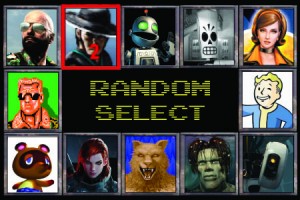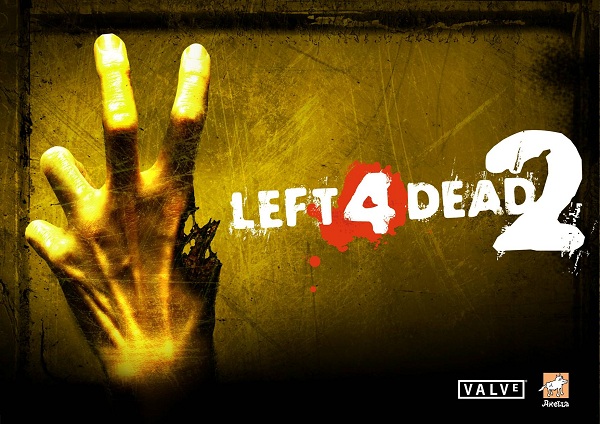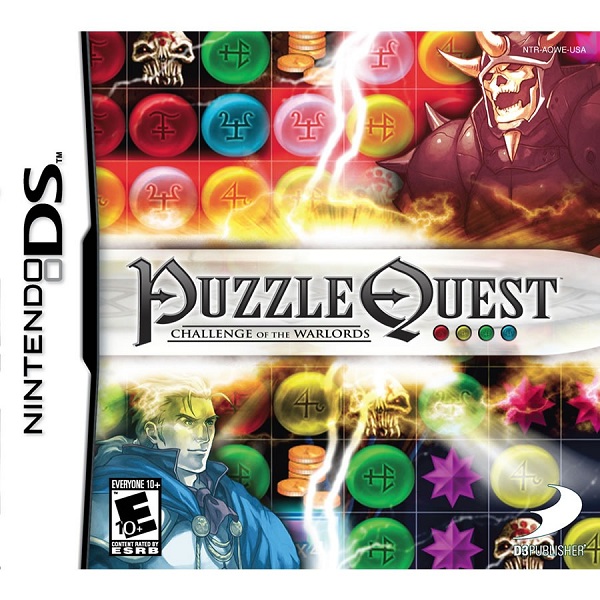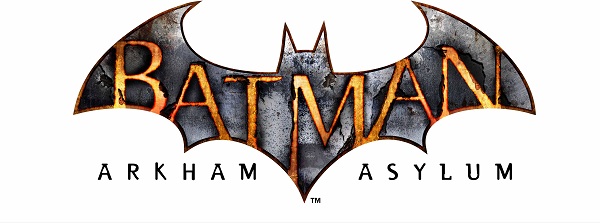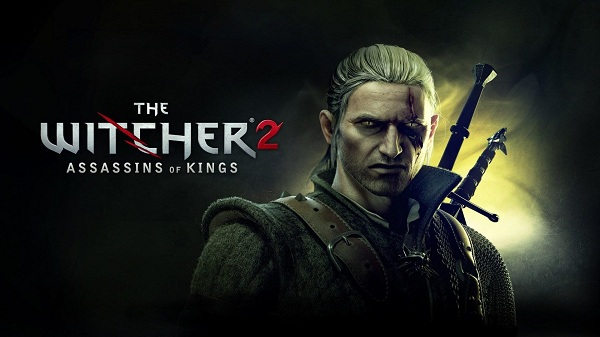To kick off Random Select for 2014, we decided to take a look back at the outgoing generation of games and pick some of the titles that we found most memorable. While this may not necessarily mean ‘best’ in purely critical terms (Though most of these would feature in any decent Best of Gen list), for us it was all about the titles that had the strongest influence on the course of gaming. For us, these are the games that made the biggest mark, both on our own memories and on the creative directions the medium took as the generation took its course.
For the sake of argument, we’ve included PC games on the list because although the demarcation of generations is defined by the release of consoles the evolution of games in a generation stretches across all formats. It feels doubly appropriate here since this generation has seen the tech and design of PC games match consoles more closely than ever. As for the timeframe, we’re considering the generation to have started with the release of the Xbox 360 in 2005 and ended with the release of the Playstation 4 and Xbox One at the end of 2013.
Everybody Loves Tank: Left 4 Dead 2 (2009)
While some might cite Valve’s Team Fortress 2 for its spearheading of microtransactions or the idea of a game as an ever-evolving platform changing through online updates, we would argue that it’s the Left 4 Dead series that has had the larger influence over gaming.
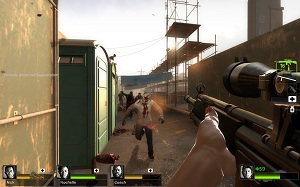 Way back in the good ol’ days of the late Noughties, people thought of online multiplayer as a purely competitive thing. While games like Battlefield and Valve’s own Counter Strike had widened the scope of things beyond simple deathmatches, the fact remained that when you went online it was to shoot at real people, who would then shoot back, and you were either good at it and thrived or were bad at it and were bestowed a life of suffering. While co-op gameplay had been around since the days of Contra and Double Dragon, it took Left 4 Dead to truly bring the concept online.
Way back in the good ol’ days of the late Noughties, people thought of online multiplayer as a purely competitive thing. While games like Battlefield and Valve’s own Counter Strike had widened the scope of things beyond simple deathmatches, the fact remained that when you went online it was to shoot at real people, who would then shoot back, and you were either good at it and thrived or were bad at it and were bestowed a life of suffering. While co-op gameplay had been around since the days of Contra and Double Dragon, it took Left 4 Dead to truly bring the concept online.
Left 4 Dead 2 took the ideas established by the original and doubled down on everything: More maps, more modes, more zombies, and eventually updated with content from the original game making the definitive Left 4 Dead. While the shorter game modes are fun if weighted a little heavily difficulty-wise towards having a full stable of human players, the real meat of the game is in the campaign missions, with clever level design combining with the ingenious/sadistic Director AI system to provide some of the most brutal, seat-of-your-pants co-op experiences you’ll ever enjoy.
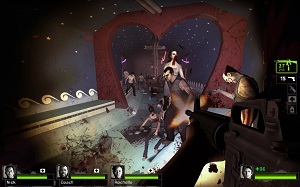 In addition, the various messages scrawled on the walls of the safehouses and places of interest in the game’s levels gave a real sense of place and atmosphere, providing a genuinely innovative way of providing backstory to players who wanted it. You could ignore everything and concentrate on the shooting, but if you chose to examine the stories of these hapless wall-scribblers you could learn a huge amount about the outbreak surrounding your team’s relatively insignificant trials. It was an early example of how storytelling could be used subtly – advice that even today, one wishes more developers would heed.
In addition, the various messages scrawled on the walls of the safehouses and places of interest in the game’s levels gave a real sense of place and atmosphere, providing a genuinely innovative way of providing backstory to players who wanted it. You could ignore everything and concentrate on the shooting, but if you chose to examine the stories of these hapless wall-scribblers you could learn a huge amount about the outbreak surrounding your team’s relatively insignificant trials. It was an early example of how storytelling could be used subtly – advice that even today, one wishes more developers would heed.
Congraturations! You Are Pyrrhic: The Walking Dead Season One (2012)
Keeping with the zombie theme for a minute, it’s a rare conversation about the current state of writing in videogames that doesn’t turn to The Walking Dead at some point. It’s a series that hit the zeitgeist in all the right spots, from a developer who came of age at just the right time. In retrospect, the general backlash directed at Telltale Games in the leadup to the game’s release seems somewhat unwarranted: Jurassic Park may have been a huge misstep, but they had up to that point received solid reviews and no small amount goodwill for their series of nostalgia-fuelled point-and-click adventures, something that seemed to evaporate overnight thanks to their unfortunate dino-folly.
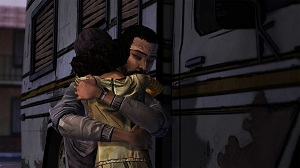 Thankfully, Telltale appeared to take this dip in popularity as a motivator and gave us a Walking Dead story that not only matched the power of Robert Kirkman and Charlie Adlard’s original comic series, but with the help of sharp writing and uniformly superb voice acting arguably surpassed it. Playing as Lee Everett, a convict unexpectedly freed when the zombie apocalypse interrupts his ride to prison, you’re launched straight into the merciless human drama on which the franchise was built.
Thankfully, Telltale appeared to take this dip in popularity as a motivator and gave us a Walking Dead story that not only matched the power of Robert Kirkman and Charlie Adlard’s original comic series, but with the help of sharp writing and uniformly superb voice acting arguably surpassed it. Playing as Lee Everett, a convict unexpectedly freed when the zombie apocalypse interrupts his ride to prison, you’re launched straight into the merciless human drama on which the franchise was built.
The Walking Dead adheres strictly to the idea that the worst thing about the zombie apocalypse is all the people who are still alive. While this is a trope that has been a mainstay of the zombie apocalypse genre since its inception, the comic (And to a lesser extent, the TV series) distinguished itself by its often brutal faithfulness to the idea. While the game has so far avoided the other versions’ most famous villain, The Governor, danger is still omnipresent from its cast of bandits, cannibals and the not-always-stable survivors you find along the way.
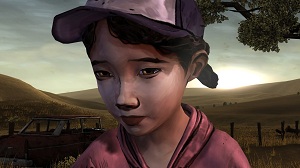 At its core, The Walking Dead is a relationship management game more than anything else. Uncomfortably thrust into the role of de facto leader of this rag-tag group of survivors, Lee’s – and therefore your – biggest problems come in keeping the volatile personalities in your group happy, or at least stopping them from killing each other. While the dialogue system at first glance looks similar to Mass Effect, the meanings of the choices are far more ambiguous here giving every response an element of risk, especially as tensions rise and allegiances begin to be demanded. Even telling someone what they want to hear can have an adverse effect on others in the conversation; in The Walking Dead, enemies are inevitable. The question is, whose bad books you think you can afford to be on. Your only real friend is a young girl called Clementine, arguably – and let’s face it, it’d be a short argument – the most well-drawn child character ever to come to a video game. If you don’t finish this thing wanting to protect her, you’re probably a monster.
At its core, The Walking Dead is a relationship management game more than anything else. Uncomfortably thrust into the role of de facto leader of this rag-tag group of survivors, Lee’s – and therefore your – biggest problems come in keeping the volatile personalities in your group happy, or at least stopping them from killing each other. While the dialogue system at first glance looks similar to Mass Effect, the meanings of the choices are far more ambiguous here giving every response an element of risk, especially as tensions rise and allegiances begin to be demanded. Even telling someone what they want to hear can have an adverse effect on others in the conversation; in The Walking Dead, enemies are inevitable. The question is, whose bad books you think you can afford to be on. Your only real friend is a young girl called Clementine, arguably – and let’s face it, it’d be a short argument – the most well-drawn child character ever to come to a video game. If you don’t finish this thing wanting to protect her, you’re probably a monster.
Rather than retreat back to safe old tricks after the disaster of Jurassic Park, Telltale stuck by its QTE-heavy format and not only made it work, coming up with one of the generation’s finest adventure games, but also came of age as a creative force. With The Wolf Among Us and Walking Dead: Season Two suggesting that the streak is still fully in effect, and releases forthcoming based on Game of Thrones and Borderlands, Telltale are heading into the new generation at the peak of their powers. Hopefully the next backlash is a long, long way away.
Better Living Through Gems: Puzzle Quest Challenge of the Warlords (2007)
Hybrid game design is hardly a new thing, but when done right it can rejuvenate previously-tired genres and influence design trends for years afterwards. Puzzle Quest is an example of this, a low-budget handheld game that sneaked onto handhelds in 2007 and to everyone’s surprise ended up becoming a monster hit – enough so that publisher D3’s meagre shipment to retailers was snapped up in a flash. Months-long stock shortages combined with ever-strengthening word of mouth does a lot to imprint a game upon gamer consciousness, sealing Puzzle Quest‘s berth among the must-play games of 2007/8.
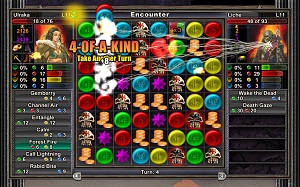 The hype was well deserved. The puzzle genre was arguably in decline at the time, with lowest common denominator mobile games dominating the scene at the expense of purer titles. Even venerable old Tetris had lost its magic, saddled with unnecessary rule changes (We’re looking at you, infinite spin) and a string of lacklustre releases (With the exception of the excellent Tetris DS). Puzzle Quest took the jewel-matching gameplay of Bejeweled, framed it within a combat-based mechanic that gave the format an urgency missing from PopCap’s game, and married it to a simple but compelling RPG system that gave the puzzling a context and scope for customization with the addition of items and magic.
The hype was well deserved. The puzzle genre was arguably in decline at the time, with lowest common denominator mobile games dominating the scene at the expense of purer titles. Even venerable old Tetris had lost its magic, saddled with unnecessary rule changes (We’re looking at you, infinite spin) and a string of lacklustre releases (With the exception of the excellent Tetris DS). Puzzle Quest took the jewel-matching gameplay of Bejeweled, framed it within a combat-based mechanic that gave the format an urgency missing from PopCap’s game, and married it to a simple but compelling RPG system that gave the puzzling a context and scope for customization with the addition of items and magic.
The plot – what there is of it – is pretty much generic high-fantasy mush, something that would kill a fully-fledged RPG but is much more suitable for a hand-held hybrid puzzle game. The bit that Infinite Interactive got right was the persistent character development, creating a real sense of growing power as your character levels up, despite (Or perhaps because of) the game’s notoriously stern – some would use the word ‘cheating’ – AI. The fact that PQ: Challenge of the Warlords is still fun despite this stands as testament to a perfect storm of gameplay styles working in tandem.
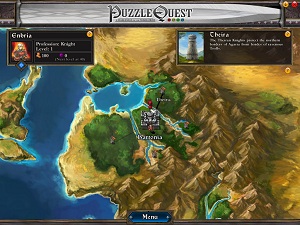 The game has most in common with roguelikes in the way that RPG progression is compressed and streamlined as much as possible, providing a concentrated ‘hit’ of progression – but while roguelikes interpret this as an endurance run, Puzzle Quest focuses on the endorphin hit provided when you level up, or use a new, more powerful weapon in combat for the first time, or steamroll an enemy for whom you were previously too weak. If the roguelike had an anthem, it would probably be Joy Division’s ‘Love Will Tear Us Apart’; Puzzle Quest‘s would be the Rocky theme.
The game has most in common with roguelikes in the way that RPG progression is compressed and streamlined as much as possible, providing a concentrated ‘hit’ of progression – but while roguelikes interpret this as an endurance run, Puzzle Quest focuses on the endorphin hit provided when you level up, or use a new, more powerful weapon in combat for the first time, or steamroll an enemy for whom you were previously too weak. If the roguelike had an anthem, it would probably be Joy Division’s ‘Love Will Tear Us Apart’; Puzzle Quest‘s would be the Rocky theme.
Ultimately, Puzzle Quest: Challenge of the Warlords is an example of a game that relies on a very precise balance of elements to work, one which Infinite Interactive itself failed to repeat with the disappointing Puzzle Quest: Galactrix (2009) and Puzzle Quest 2 (2010). The recent mobile/PC release Marvel Puzzle Quest – tellingly not developed by Infinite Interactive – is the closest the franchise has gotten to reaching the heights of the original, but its reliance on microtransactions means that Challenge of the Warlords is still the series’ peak. Thankfully it has by now been released on pretty much every format known to man, so can be enjoyed anytime.
You Wanna Get Nuts? Batman: Arkham Asylum (2009)
Despite being the most rebooted and reinterpreted superhero of them all, videogames have historically been unkind to Batman. Apart from the odd shining light, such as the 1985 isometric adventure game and some of the SNES Animated Series spinoffs, the Caped Crusader had been ill-served by enough poor releases that the announcement of any new attempt was met with more skepticism than anything else. When Batman: Arkham Asylum was announced, it looked like the perfect Batman game but fans were too accustomed to disappointment to assume too much. This made the surprise all the sweeter when the game launched, and was everything the hype proclaimed and more.
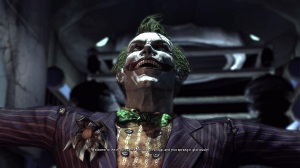 The game’s premise is simple – Joker takes over Arkham Asylum, Batman needs to stop him – but perfect for the mixture of stealth and Metroidvaniaesque (Fuck it, it’s a word now) exploration at the core of Rocksteady’s game. By confining Bats to an enclosed environment they were able to craft levels that took the fullest advantage of the character’s abilities in stealth and close-quarters combat – not to mention an abundance of inexplicably indoor gargoyles for grappling purposes. Still, who needs logical interior decoration when swinging from gargoyle to gargoyle, systematically terrorizing a room full of goons, remains one of the highlights of the generation?
The game’s premise is simple – Joker takes over Arkham Asylum, Batman needs to stop him – but perfect for the mixture of stealth and Metroidvaniaesque (Fuck it, it’s a word now) exploration at the core of Rocksteady’s game. By confining Bats to an enclosed environment they were able to craft levels that took the fullest advantage of the character’s abilities in stealth and close-quarters combat – not to mention an abundance of inexplicably indoor gargoyles for grappling purposes. Still, who needs logical interior decoration when swinging from gargoyle to gargoyle, systematically terrorizing a room full of goons, remains one of the highlights of the generation?
While much of the praise garnered by the game revolves around its gorgeous graphics, dense level design and impressive voice cast (including several TAS veterans, including Mark Hamill and Kevin Conroy reprising the Joker and Batman), it’s arguably the controls that are Arkham Asylum‘s magic ingredient. From grappling to gliding to the much-lauded (And much imitated) combat system, the controls are uniformly fluid and easy to grasp, creating a sense of ‘being the Batman’ that no other game had been able to achieve. In fact, the game pretty much encourages the player to make the most of them with its plethora of hidden collectibles and gangs of hapless goons making the simple act of exploring the island an utterly joyous experience.
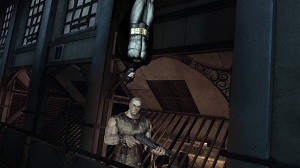 In truth, the game’s story is probably its weakest aspect, losing steam at the end with a disappointing final encounter with Joker. However, as a frame on which to hang the game’s premise it does its job and manages to squeeze in a few genuinely inventive moments (Such as the excellent Scarecrow sequences).
In truth, the game’s story is probably its weakest aspect, losing steam at the end with a disappointing final encounter with Joker. However, as a frame on which to hang the game’s premise it does its job and manages to squeeze in a few genuinely inventive moments (Such as the excellent Scarecrow sequences).
Rocksteady followed up the feat with 2011’s more ambitious (If slightly less focussed) Batman: Arkham City, with Warner Bros. Games Montreal taking the reins for last year’s reasonably-received prequel Batman: Arkham Origins. However, most would argue that Asylum‘s lean, claustrophobic adventure is the highlight of the series, and is arguably just as key as the Assassin’s Creed series in the development of the character action genre.
If Ghostbusters Recruited Conan: The Witcher 2 (2011)
In large part, this generation has been about making more accessible genres traditionally seen as being too complex for the mainstream. The RPG has arguably seen the biggest changes in this regard, with series such as Mass Effect putting increasing amounts of effort into streamlining themselves into a more action-friendly form. Naturally, this led to something of a backlash, especially amongst PC players uncomfortable with publishers striving for parity with the consoles, and ultimately a separate movement of RPGs harking back to the genre’s more hardcore roots.
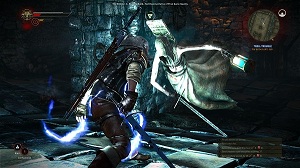 The Witcher 2 was such a game. It’s obtuse, it’s challenging and it demands you get proficient with its multitude of menu screens stuffed with dozens of items which demand equipping/upgrading/culling. Its sprawling plot involves dozens of characters, many of which disappear from the story for extended periods of time, and it bursts at the seams with so many sidequests and divergent plot points that individual playthroughs can end up significantly different from each other. It is, in technical language, not fucking about and it also happens to be one of the best things to hit the PC in years.
The Witcher 2 was such a game. It’s obtuse, it’s challenging and it demands you get proficient with its multitude of menu screens stuffed with dozens of items which demand equipping/upgrading/culling. Its sprawling plot involves dozens of characters, many of which disappear from the story for extended periods of time, and it bursts at the seams with so many sidequests and divergent plot points that individual playthroughs can end up significantly different from each other. It is, in technical language, not fucking about and it also happens to be one of the best things to hit the PC in years.
Then there’s the graphics. Though the game is still gorgeous on low settings, it was the first game to come along in a long time that used the PC to its fullest visually. While the trend at the time towards parity with consoles was undoubtedly a good thing, calling a halt on the tech arms race that had made sustaining a gaming PC financially untenable for anyone but the hardest of the hardcore, it was still nice to see a game show what the PC could do when pushed. Even more impressively, you didn’t even need an insanely powerful rig to see these extreme pretties, thanks to masterful coding on CD Projekt RED’s part. Even the Xbox 360 port was stunning, ekeing stunning visuals from Microsoft’s ageing machine.
In retrospect, it could be said that the game caught a huge break with Western audiences thanks to its gritty, cynical tone. In line with Andrzej Sapkopwski’s original novels, Geralt of Rivia is a stern figure in a world full of political intrigue and a paucity of moral strength: exactly the kind of take on fantasy for which Western audiences seem to have developed a hunger, judging by Game of Thrones (Which debuted on HBO a month before the game’s release). While the Witcher games lack some of the more progressive layers of George R. R. Martin’s work, particularly concerning women, both properties possess an unerring faith in the essential brutality of civilization and while Sapkowski’s world uses the more fantastical elements of high fantasy more liberally, both frame these elements in a more grounded, realistic tone.
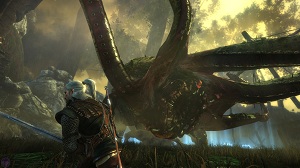 Throw in the general nostalgia for old-fashioned RPG gameplay, and it’s easy to see how The Witcher 2 became CD Projekt’s breakout game. There’s a purity to the game shared by the title that almost pipped it for for the ‘Old-school RPG’ slot of this list: From Software’s Dark Souls, another game that demands that the player adapt to it rather than appeal to universal comfort zones. With a series of extensive updates that vastly improved and expanded the game at no extra cost to the consumer, and a refreshingly progressive attitude towards DRM (Not to mention their hand in a certain website called GOG.com), CD Projekt RED only built on the fanbase established by the Witcher games to become one of the loved developers out there today. With Witcher 3: Wild Hunt concluding Geralt’s adventures on PC and next-gen consoles later this year and an adaptation of the Cyberpunk tabletop role-playing game further down the pipe, it’s looking like happy times for RPG fans.
Throw in the general nostalgia for old-fashioned RPG gameplay, and it’s easy to see how The Witcher 2 became CD Projekt’s breakout game. There’s a purity to the game shared by the title that almost pipped it for for the ‘Old-school RPG’ slot of this list: From Software’s Dark Souls, another game that demands that the player adapt to it rather than appeal to universal comfort zones. With a series of extensive updates that vastly improved and expanded the game at no extra cost to the consumer, and a refreshingly progressive attitude towards DRM (Not to mention their hand in a certain website called GOG.com), CD Projekt RED only built on the fanbase established by the Witcher games to become one of the loved developers out there today. With Witcher 3: Wild Hunt concluding Geralt’s adventures on PC and next-gen consoles later this year and an adaptation of the Cyberpunk tabletop role-playing game further down the pipe, it’s looking like happy times for RPG fans.
Part 2 coming soon!
